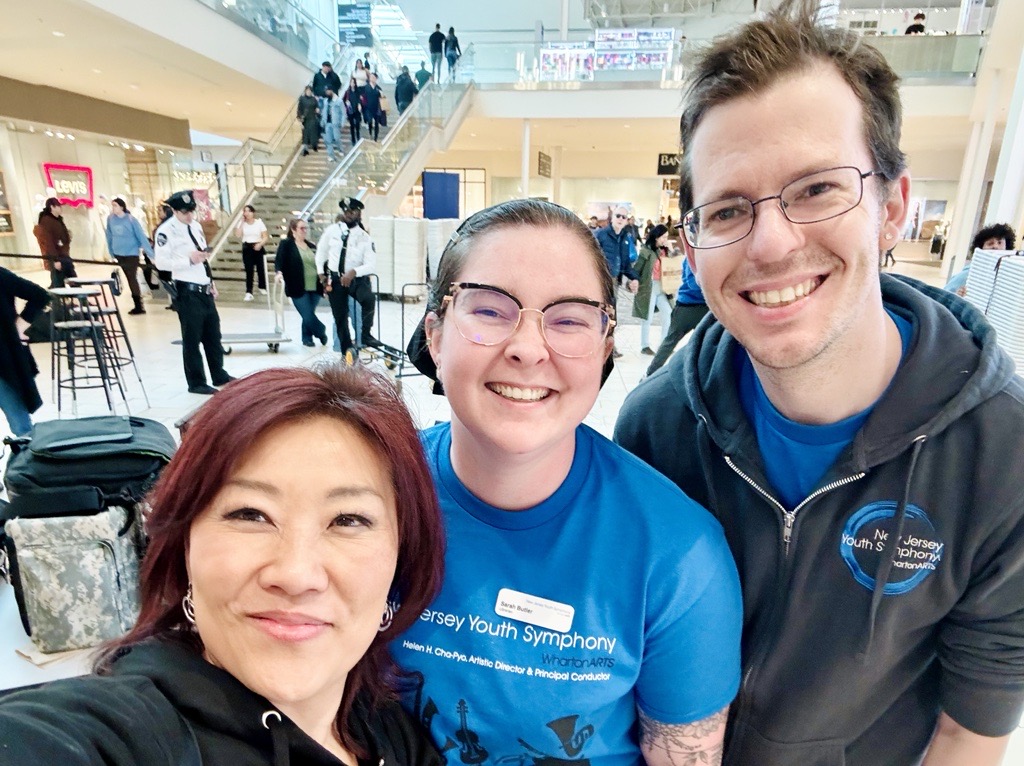
Your Backstage Pass with NJYS Music Librarian Sarah Butler
For about a year now, I’ve been the music librarian with the New Jersey Youth Symphony. I’m originally from Alabama (just outside the Huntsville area) and have lived in New Jersey for 5 years now. My parents and grandparents have been farmers, accountants, and NASA engineers, but I’m the first artist or musician in my family. I play clarinet and have a BM in performance from the University of Alabama, as well as an MM in performance from Rutgers. Additionally, I earned a BS in French language and literature from Alabama and am currently pursuing an MA in music theory at Rutgers. My research interests include serialism, form studies, and video game music. When I’m not playing an instrument, analyzing music, or spending my time at NJYS, I love to knit, draw, and go birding – and I’m also an aviation geek, so you can catch me “planespotting” and listening to the latest airline news if you’re lucky. Let’s just say I have a lot of interests!
Going all the way back to high school, I was already involved in some of the responsibilities I most enjoy now in my role at NJYS. I was elected librarian for my high school band to help organize, inventory, and distribute music with my band director for two or three years. When I attended Rutgers University, I also worked in the orchestra library and was part of a team of librarians for several years.
The music library here at NJYS is a well-oiled machine. It’s where all the music we own is stored, neatly organized and catalogued – with everything from Beethoven symphonies to Sousa marches, from oboe choir arrangements to method books for each instrument. It’s also where all the music is prepared year-round for each of our almost 600 NJYS students! The library provides a saving grace for some students on concert days as well; for example, we provide emergency copies for students who forget their music, which lessens anxiety and stress for students and their parents before performances.
A day in the life of the NJYS librarian varies throughout the year, depending on how much music is required for performances, what concerts are upcoming, and when Playathon is on the horizon. Generally, though, my job begins with email communication, such as discussing music selections with conductors, reaching out to parent and student volunteers who want to come help out in the library, and tracking down program notes for concert days. Coordinating music rentals and purchases is a huge responsibility of the music librarian. Rentals allow NJYS to continue its rich history of commissions and premiers that sets it apart from other youth symphonies. After emails, I switch focus to pertinent tasks that can range from preparing parts for students to readying folders for concert days, spiral binding scores for conductors, or even engraving transposed or arranged parts and pieces myself with notation software.
I like to finish a day of work by tackling catalogue information for one or two pieces. The library houses, in my estimate, close to 2,000 pieces of music, many of which aren’t in any sort of database, and many more which aren’t digitized. Since I started at Wharton Arts, I’ve been slowly working my way through the collection, carefully recording any and all information about each piece and painstakingly digitizing each part and score. I’ve done this with over 400 titles so far. In the largest section, for full orchestra, I’ve already put it in alphabetic order to Poulenc! I hope to make it to Z by the end of 2024. We recently switched to a new database software, which allows for easier access for the whole organization, and stores a combination of all our archives in one place, and relationally links all that archival information to the library. It’s a great way to wind down a workday, as well as familiarize myself with the contents of the library by creating an archive for the future.
With almost 600 students across 17 performing ensembles, it’s not possible for one person to do it all. I have to give a huge shoutout to all the volunteers who help me run the library so smoothly. Whether they’re parents of students in the organization, students themselves, or just people who love music education and want to help promote it, I couldn’t do it without them.